句子成分与连词
句子成分
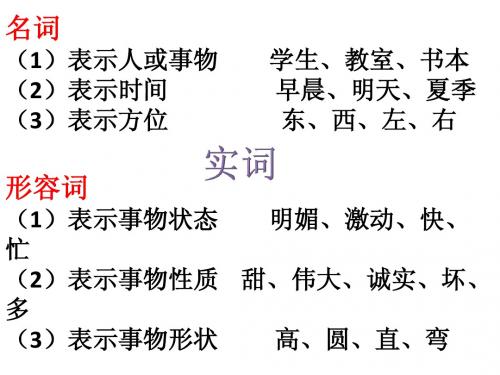
中国是弱国,所以中国人当然是低能儿, 分数在60分以上,便不是自己的能力了:也无 怪他们疑惑。但我接着便有参观枪毙中国人的 命运了。第二年添教霉菌学,细菌的形状是全 用电影来显示的,一段落已完而还没有到下课 的时候,便影几片时事的片子,自然都是日本 战胜俄国的情形。但偏有中国人夹在里边:给 俄国人做侦探,被日本军捕获,要枪毙了,围 着看的也是一群中国人;在讲堂里的还有一个 我。
“人家说了再做,我是做了再说。” “人家说了也不一定做,我是做了也不一定说。” 作为学者和诗人的闻一多先生,…… “漂白了的四 壁”……竹纸本子,写满了密密麻麻的小楷,如群蚁排衙。 几年辛苦,凝结而成《唐诗杂论》的硕果。 他并没有先“说”,但他“做”了。作出了卓越的成 绩。 “做”了,他自己也没有“说”。他又由唐诗转到楚 辞……成了“何妨一下楼”的主人。 做了再说,做了不说,这仅是闻一多先生的一个方 面,——作为学者的方面。 闻一多先生还有另外一个方面,——作为革命家的方 面。 这个方面……
3、动宾短语:有的动词单独使用就可以表 达一个明确的意思,有的动词还要在后边 带上一个受动词支配的词,组成一个短语, 才能表达一个明确的意思,这种短语叫做 动宾短语。其中受动词支配的词是宾语, 表示动作、行为的对象、结果、处所等 例如:吃晚饭 、卖豆浆、夸奖我 4、主谓短语:两个词之间是陈述和被陈述 的关系,这种短语叫主ቤተ መጻሕፍቲ ባይዱ短语 例如:养分多、举止稳重、天气好
来、进去、过来 是、就是、正是
副词:用来修饰动词或者形容词 (1)表示时间、频率:已经、曾经、刚才、 终于、顿时、偶尔、一直 (2)表示程度:很、挺、更、非常、十分、 最、太、过于、稍微 (3)表示范围:都、全都、总、统统、仅 仅、只 (4)表示重复:连续、又、再、也、还 (5)表示语气:可、却、倒、偏、难道 (6)表示肯定、否定:可能、不、没有、 没、必定、也许、或许
英语句子成分分析(最完整版)
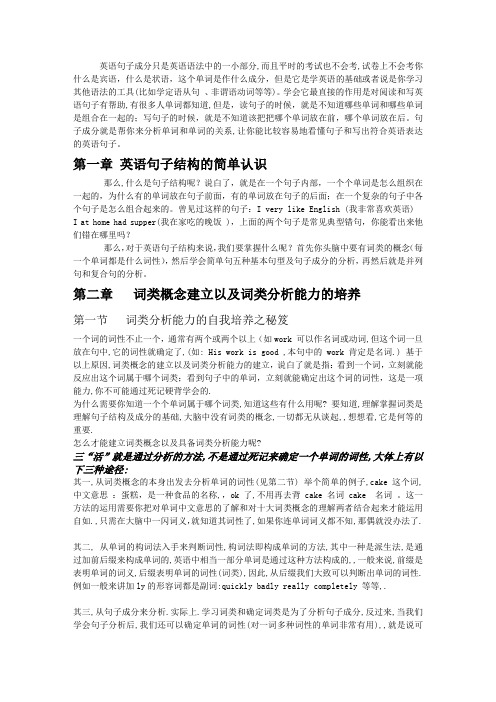
英语句子成分只是英语语法中的一小部分,而且平时的考试也不会考,试卷上不会考你什么是宾语,什么是状语,这个单词是作什么成分,但是它是学英语的基础或者说是你学习其他语法的工具(比如学定语从句、非谓语动词等等)。
学会它最直接的作用是对阅读和写英语句子有帮助,有很多人单词都知道,但是,读句子的时候,就是不知道哪些单词和哪些单词是组合在一起的;写句子的时候,就是不知道该把把哪个单词放在前,哪个单词放在后。
句子成分就是帮你来分析单词和单词的关系,让你能比较容易地看懂句子和写出符合英语表达的英语句子。
第一章英语句子结构的简单认识那么,什么是句子结构呢?说白了,就是在一个句子内部,一个个单词是怎么组织在一起的,为什么有的单词放在句子前面,有的单词放在句子的后面;在一个复杂的句子中各个句子是怎么组合起来的。
曾见过这样的句子:I very like English (我非常喜欢英语) I at home had supper(我在家吃的晚饭 ),上面的两个句子是常见典型错句,你能看出来他们错在哪里吗?那么,对于英语句子结构来说,我们要掌握什么呢?首先你头脑中要有词类的概念(每一个单词都是什么词性),然后学会简单句五种基本句型及句子成分的分析,再然后就是并列句和复合句的分析。
第二章词类概念建立以及词类分析能力的培养第一节词类分析能力的自我培养之秘笈一个词的词性不止一个,通常有两个或两个以上(如work 可以作名词或动词,但这个词一旦放在句中,它的词性就确定了,(如: His work is good ,本句中的work 肯定是名词.) 基于以上原因,词类概念的建立以及词类分析能力的建立,说白了就是指:看到一个词,立刻就能反应出这个词属于哪个词类;看到句子中的单词,立刻就能确定出这个词的词性,这是一项能力,你不可能通过死记硬背学会的.为什么需要你知道一个个单词属于哪个词类,知道这些有什么用呢? 要知道,理解掌握词类是理解句子结构及成分的基础,大脑中没有词类的概念,一切都无从谈起,,想想看,它是何等的重要.怎么才能建立词类概念以及具备词类分析能力呢?三“活”就是通过分析的方法,不是通过死记来确定一个单词的词性,大体上有以下三种途径:其一,从词类概念的本身出发去分析单词的词性(见第二节) 举个简单的例子,cake 这个词,中文意思:蛋糕,是一种食品的名称,,ok 了,不用再去背 cake 名词 cake 名词。
句子基本结构和成分
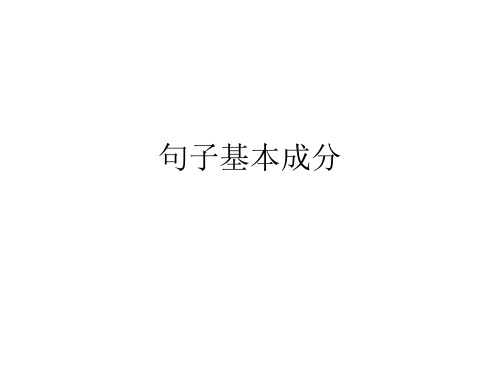
late. 6. The excited boys burst into cheers. 7. A woman police officer was praised for
This term I have written three letters to my parents.
改错
1. He happy after he heard the news. was
2. It is a bad habit sleep in class. 3. I think that a gotood idea to have a walk every day.
7. His speech was boring.
8. The whole class got excited at the good news.
常见的系动词有: be动词: am, is, are 感官系动词: feel, smell, sound, taste, look 变化系动词: become, grow, turn, fall, get, go, come 状态系动词: seem, keep, remain, stay, appear
找宾语
4. We enjoy listening to music.
5. She said that she felt sick.
6. They sent the injured to hospital.
7. I find it impossible to believe her any longer.
语文句子成分
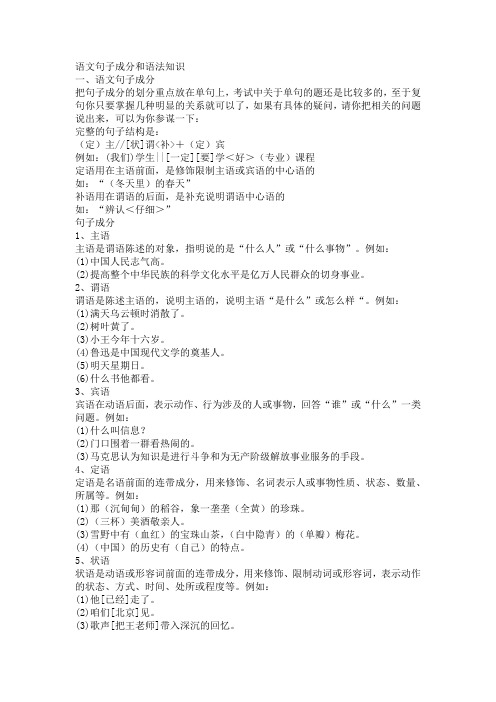
语文句子成分和语法知识一、语文句子成分把句子成分的划分重点放在单句上,考试中关于单句的题还是比较多的,至于复句你只要掌握几种明显的关系就可以了,如果有具体的疑问,请你把相关的问题说出来,可以为你参谋一下:完整的句子结构是:(定)主//[状]谓<补>+(定)宾例如:(我们)学生||[一定][要]学<好>(专业)课程定语用在主语前面,是修饰限制主语或宾语的中心语的如:“(冬天里)的春天”补语用在谓语的后面,是补充说明谓语中心语的如:“辨认<仔细>”句子成分1、主语主语是谓语陈述的对象,指明说的是“什么人”或“什么事物”。
例如:(1)中国人民志气高。
(2)提高整个中华民族的科学文化水平是亿万人民群众的切身事业。
2、谓语谓语是陈述主语的,说明主语的,说明主语“是什么”或怎么样“。
例如:(1)满天乌云顿时消散了。
(2)树叶黄了。
(3)小王今年十六岁。
(4)鲁迅是中国现代文学的奠基人。
(5)明天星期日。
(6)什么书他都看。
3、宾语宾语在动语后面,表示动作、行为涉及的人或事物,回答“谁”或“什么”一类问题。
例如:(1)什么叫信息?(2)门口围着一群看热闹的。
(3)马克思认为知识是进行斗争和为无产阶级解放事业服务的手段。
4、定语定语是名语前面的连带成分,用来修饰、名词表示人或事物性质、状态、数量、所属等。
例如:(1)那(沉甸甸)的稻谷,象一垄垄(全黄)的珍珠。
(2)(三杯)美酒敬亲人。
(3)雪野中有(血红)的宝珠山茶,(白中隐青)的(单瓣)梅花。
(4)(中国)的历史有(自己)的特点。
5、状语状语是动语或形容词前面的连带成分,用来修饰、限制动词或形容词,表示动作的状态、方式、时间、处所或程度等。
例如:(1)他[已经]走了。
(2)咱们[北京]见。
(3)歌声[把王老师]带入深沉的回忆。
(4)科学[终于以伟大的不可抑制的力量]战胜了神权。
副词、形容词经常作状语,表时间、处所的名词经常作状语,一般名词不作状语。
英语的句子成分
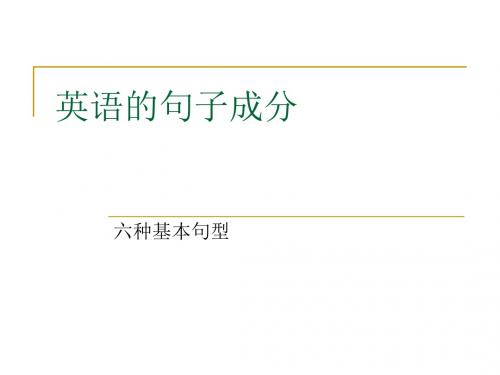
直接宾语:动作涉及的事物 间接宾语:动作对谁做或者为谁做
五、主语+及物动词+宾语+宾语补足语 (S+V+O+C) e.g. a. They made him their monitor. b. We consider him very capable.
There be句型
There be”是表示“存在”的一种基本方式, 其 句型结构通常为::There be + sb./sth. + somewhere/doing sth。但仅仅知道这点用法 还远远不够,“There be”还有更多较为特殊的用 法。
九、同位语。可以作同位语的: 1、 名词:Many English people have three names: a first name, a middle name and the family name. 2、 代词:We had a lovely holiday, one of the best ever. 3、 数词:These handbooks are for you five. 4、 -ing分词(短语):He had earned enough money to start his own business, offering guide services to tourists. 5、 of所有格:I live in the city of Nanjing. 6、 介词短语:These coins were used for the next 2,000 years, that is, from 221BC until 1916.
在There be引导的句子中, 谓语动词be的人称和数应该和它后面的 主语(名词)保持一致, 当有两个或两个以上的名词作并列主语时, be的形式则和第一个名词保持一致(就近原则)。如: There is a small river near the village. 村子附近有条小河。
学习中的常见连词和句子连接词
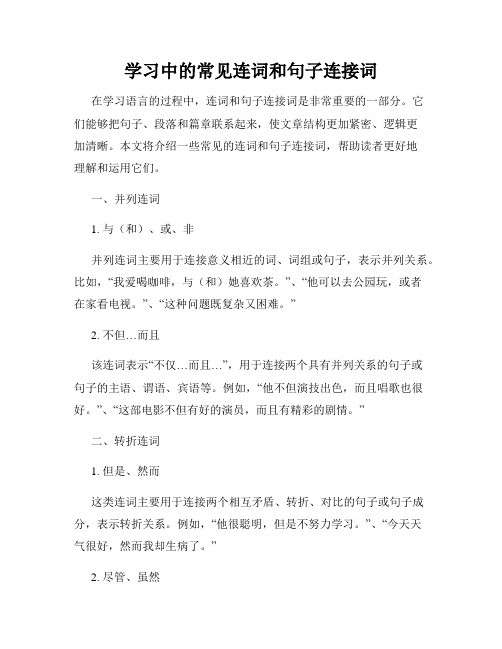
学习中的常见连词和句子连接词在学习语言的过程中,连词和句子连接词是非常重要的一部分。
它们能够把句子、段落和篇章联系起来,使文章结构更加紧密、逻辑更加清晰。
本文将介绍一些常见的连词和句子连接词,帮助读者更好地理解和运用它们。
一、并列连词1. 与(和)、或、非并列连词主要用于连接意义相近的词、词组或句子,表示并列关系。
比如,“我爱喝咖啡,与(和)她喜欢茶。
”、“他可以去公园玩,或者在家看电视。
”、“这种问题既复杂又困难。
”2. 不但…而且该连词表示“不仅…而且…”,用于连接两个具有并列关系的句子或句子的主语、谓语、宾语等。
例如,“他不但演技出色,而且唱歌也很好。
”、“这部电影不但有好的演员,而且有精彩的剧情。
”二、转折连词1. 但是、然而这类连词主要用于连接两个相互矛盾、转折、对比的句子或句子成分,表示转折关系。
例如,“他很聪明,但是不努力学习。
”、“今天天气很好,然而我却生病了。
”2. 尽管、虽然这类连词引导的从句表示对主句的让步,使用时强调主句与从句的矛盾关系。
比如,“尽管下雨了,他还是去了操场。
”、“虽然很累,但我还是坚持完成了任务。
”三、因果连词1. 因为、所以因果连词用来连接两个表达原因和结果关系的句子或句子成分。
例如,“他很努力学习,所以成绩很好。
”、“因为下雪了,所以她没能来参加聚会。
”四、条件连词1. 如果、要是条件连词引导的从句表示假设、条件。
常用于表示对未来的推测、猜测或提出条件。
比如,“如果天气好,我们就去公园玩。
”、“要是你不会做,我可以帮你。
”五、解释连词1. 也就是说、换句话说这类连词主要用于解释、概括或进一步说明前面所说的内容。
例如,“他很有才华,也就是说他在各个方面都很出色。
”、“换句话说,这个方案不太可行。
”六、递进连词1. 而且、并且、再者递进连词用于连接含有并列关系的句子或句子成分,表示逐步推进或递进的关系。
比如,“他不仅聪明,而且勤奋。
”、“这个问题不仅重要,而且紧迫。
汉语语法知识(词类、短语、句子成分)
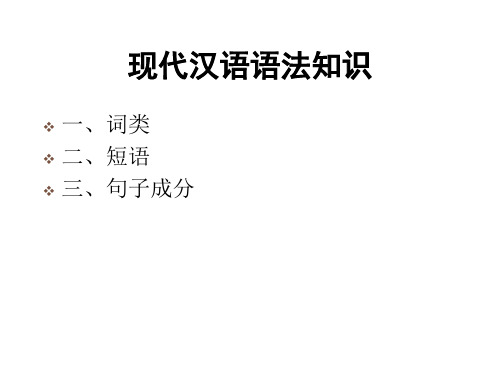
一个(人) 一把(鐮刀) 一屋子(人) 这 匹( 马) 那 头( 猪) 去一次 说一遍 看一眼
请把在这段文字中的数量词找出来。 在默默里算着,八千多日子已经从我 手中溜去;像针尖上一滴水滴在大海里, 我的日子滴在时间的流里,没有些声音, 也没有丝影子。
用来 一般只 ①表示 (七) 修饰、 能用在 程度的 副 限制 动词、 词 动词、 形容词 ②表示 形容 或其他 范围的 词或 副词前 其他 作状语。③表示 副词 一般不 时间的 的词 能和名 短语合。④表示 否定的
很、太、最、十分、 非常 都、全、只、统统、 仅仅、就 正、刚、又、曾经、 终于、就 不、未、没有(看见)
⑤表示 偏偏、也许、简直、 语气的 难道
找出下面句子中的副词 1.你居然敢告诉他。 2.你来晚了,他已经走了。 3.别急,我马上就来。 4.我们都很着急。
起转介 ①介词后边不能 ①表示对象、 (八 作用的词, 关系的 加时态助词 ) 一般用在 “着”“了”“ 介 名词、代 过”。 词 词或名词 ②不能重迭。 ②表示处所、 性短语的 ③不能单说,也 方向的 前边,合 不能单独作谓语, ③表示时间的 起来组成 必须放在名词、 介词结构, 代词或名词性短 ④表示状态方 以表示处 语前边组成介词 式的 结构。 所、时间、 ⑤表示原因的 状态、方 ④介词结构也不 式、原因、 能单说,不能单 ⑥表示目的的 目的、比 独作谓语,它在 较对象等。 句中主要是作状 语,有少数也能 ⑦表示比较的 作补语或定语。 ⑧表示排除的
嗯、唉
请把在这段文字中的叹词找出来。
“ 哎呀,你丢钱啦!” “唔,是叫我吗?” “嘿,不是你还有谁呀。傻帽!” “哦!谢谢!”
模拟自然 模拟性、 (十 界声响而 主观性 二) 造的词汇 拟 声 词
句子成分概述 (2)
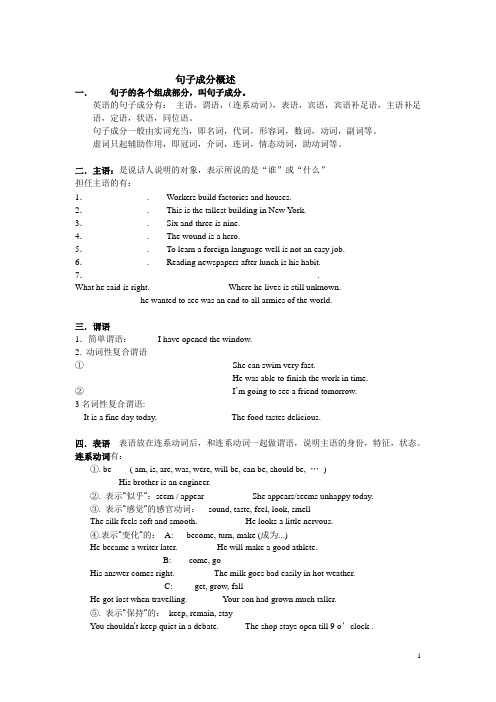
句子成分概述一.句子的各个组成部分,叫句子成分。
英语的句子成分有:主语,谓语,(连系动词),表语,宾语,宾语补足语,主语补足语,定语,状语,同位语。
句子成分一般由实词充当,即名词,代词,形容词,数词,动词,副词等。
虚词只起辅助作用,即冠词,介词,连词,情态动词,助动词等。
二.主语:是说话人说明的对象,表示所说的是“谁”或“什么”担任主语的有:1._____________. Workers build factories and houses.2._____________. This is the tallest building in New York.3._____________. Six and three is nine.4._____________. The wound is a hero.5._____________. To learn a foreign language well is not an easy job.6._____________. Reading newspapers after lunch is his habit.7.____________________________________________________.What he said is right. Where he lives is still unknown._______________he wanted to see was an end to all armies of the world.三.谓语1.简单谓语:I have opened the window.2. 动词性复合谓语①__________________________ She can swim very fast.He was able to finish the work in time.②____________________________ I’m going to see a friend tomorrow.3名词性复合谓语: ______________________It is a fine day today. The food tastes delicious.四.表语表语放在连系动词后,和连系动词一起做谓语,说明主语的身份,特征,状态。
英语十大词性以及与句子成分的关系
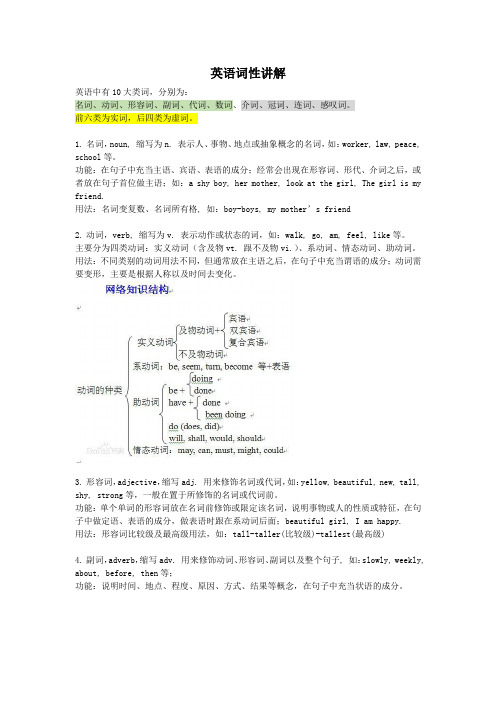
英语词性讲解英语中有10大类词,分别为:名词、动词、形容词、副词、代词、数词、介词、冠词、连词、感叹词。
前六类为实词,后四类为虚词。
1.名词,noun, 缩写为n. 表示人、事物、地点或抽象概念的名词,如:worker, law, peace, school等。
功能:在句子中充当主语、宾语、表语的成分;经常会出现在形容词、形代、介词之后,或者放在句子首位做主语;如:a shy boy, her mother, look at the girl, The girl is my friend.用法:名词变复数、名词所有格, 如:boy-boys, my mother’s friend2.动词,verb, 缩写为v. 表示动作或状态的词,如:walk, go, am, feel, like等。
主要分为四类动词:实义动词(含及物vt. 跟不及物vi.)、系动词、情态动词、助动词。
用法:不同类别的动词用法不同,但通常放在主语之后,在句子中充当谓语的成分;动词需要变形,主要是根据人称以及时间去变化。
3.形容词,adjective,缩写adj. 用来修饰名词或代词,如:yellow, beautiful, new, tall, shy, strong等,一般在置于所修饰的名词或代词前。
功能:单个单词的形容词放在名词前修饰或限定该名词,说明事物或人的性质或特征,在句子中做定语、表语的成分,做表语时跟在系动词后面;beautiful girl, I am happy.用法:形容词比较级及最高级用法,如:tall-taller(比较级)-tallest(最高级)4.副词,adverb,缩写adv. 用来修饰动词、形容词、副词以及整个句子, 如:slowly, weekly, about, before, then等;功能:说明时间、地点、程度、原因、方式、结果等概念,在句子中充当状语的成分。
5.代词,pronoun, 缩写为pron. 用来代替名词的词,如:he, she, they, that, some, other 等;功能:在句子中可充当主语、宾语、定语、表语。
四年级英语连词成句知识点

1.句子的基本结构:英语句子通常由主语、谓语和宾语组成。
在连词成句的过程中,需要正确使用句子的基本结构来构造句子。
例子:I eat an apple.(我吃一个苹果。
)
2.语序:英语中的语序为主谓宾,即主语在前,谓语在中间,宾语在后。
在连词成句时,需要注意正确的语序。
例子:She helps her brother.(她帮助她的弟弟。
)
3.词汇的使用:在连词成句中,需要正确使用各种词汇,包括动词、名词、形容词等。
在选择词汇时需要注意其正确的形式和用法。
例子:He is a teacher.(他是一名老师。
)
4.时态的选择:英语中有多个时态,如一般现在时、一般过去时等。
在连词成句时,需要根据具体的语境选择合适的时态。
例子:She is playing soccer.(她正在踢足球。
)
5.连词的使用:连词是连接句子或句子成分的词语。
在连词成句中,需要使用适当的连词将句子或句子成分连接起来。
例子:I like apples and oranges.(我喜欢苹果和橙子。
)
这些是四年级英语连词成句的主要知识点,通过掌握这些知识点,可以帮助学生正确地构造和理解句子。
句子结构

句子结构1、句子成分1. 主语:动作执行者。
当主语为人称代词时,要用主格。
主语是一个句子所叙述的主体,一般位于句首。
但在there be结构,疑问句(当主语不疑问句词时)和倒装句中,主语位于谓语,助动词或情态动词后面。
主语可由名词,代词,数词,不定式,动名词,名词化的形容词和主语从句等表示。
2. 谓语:谓语分两种,表示动作和表示状态。
使用时要注意时态和单复数。
简单谓语:由一个动词或动词短语构成。
复合谓语:(1)由情态动词或其他助动词加动词原形构成。
(2)由系动词加表语构成3. 宾语:动作的承受者,当宾语为人称代词时,用宾格。
一般位于及物动词和介词后面宾语种类:(1)双宾语(间接宾语+直接宾语)(2) 复合宾语(宾语+宾补)4. 表语:一定跟在系动词(be,become,get,look,grow,turn,seem等)一般由名词,代词,形容词,分词,数词,不定式,动名词,介词短语,副词及表语从句表示系动词:包括be动词和半系动词(即感官动词:sound、feel、smell等)5. 状语:修饰动词,形容词,副词或整个句子,说明动作或状态特征的句子成分,叫做状语可由1.副词及副词性词组2.介词短语3不定式短语4.介词短语5.名词6.状语短语表示种类有:1.时间状语2.原因状语3.条件状语4.地点状语5.方式状语6.伴随状语7.目的状语8.结果状语9.让步状语10.比较状语6. 同位语:Tom,my classmate is a good student. 这句话中Tom 和 myclassmate 是同位语。
同位语从句和定语从句的区别同位语从句是对对象的进一步解释,一定是对抽象名词的解释。
That不能省定语从句是指定了范围的。
对对象的修饰。
7. 定语:用来修饰名词。
后面一定是名词。
或修饰代词的词,短语或从句称为定语形容词修饰名词,副词修饰形容词、动词、副词。
二、句子结构1. 简单句只有一个主语(或并列主语)和一个谓语(或并列谓语)的句子叫简单句。
句子成分

一、句子六种成分●主语、谓语、宾语;●——三种主要成分●定语、状语、补语;●——三种附属成分实词:名词(表人或物、表时间、表方位)动词(动作行为、发展变化、心理活动等)形容词(表事物的形状、性质、状态)数词(含确数、概数、序数)量词(表物量或动量)代词(含人称、疑问和指示代词)虚词:副词(用在动词或形容词前)介词(用在名词或代词前)连词(起连接作用)助词(起辅助作用,表附加的语气、动态或结构意义)叹词(表示感叹或呼唤应答)拟声词(摹拟事物的声音)1、主语:是一句话陈述的对象,表示谁或什么;主要由名词、代词充当,动词、形容词、数量词及其短语也可充当主语。
如:回家的感觉又不知不觉涌上心头。
2、谓语:是对主语加以陈述的,说明主语怎么样或是什么。
一般由动词和形容词充当。
如:战士们英勇顽强。
你是学生。
2、谓语谓语是陈述主语、说明主语的。
说明主语“是什么”或“怎么样”。
例如:⑴满天乌云顿时消散了。
⑵树叶黄了。
⑶小王今年十六岁。
⑷鲁迅是中国现代文学的奠基人。
⑸明天星期日。
⑹什么书他都看。
3、宾语:是动词谓语后边的连带成分,表示动作行为涉及的人或事物. 它一般可以回答动作行为涉及的是“谁”或“什么”的问题.一般由名词和代词充当.如:大家喜欢游泳.他给我一本书(双宾语)例如:⑴什么叫信息?⑵门口围观一群看热闹的。
⑶马克思认为知识是进行斗争和为无产阶级解放事业服务的手段。
4、定语:定语是名词前边的修饰语,对名词起修饰限制作用。
名词、动词、形容词、数量词和短语充当定语。
“的”是定语的标志。
如:(浅浅的)月光流进了村子.注意:定语后置如:荷塘的四面长着许多树,(蓊蓊郁郁的)例如:⑴那(沉甸甸)的稻谷,象一垄垄(全黄)的珍珠。
⑵(三杯)美洒敬亲人。
⑶雪野中有(血红)的宝珠山茶,(白中隐青)的(单瓣)梅花。
⑷(中国)的历史有(自己)的特点。
5、状语:状语是谓语前边的修饰语,对谓语起修饰作用,一般放在动词或者形容词的前面.表示动作的状态、时间、处所或者程度.“地”是状语的标志.如:例如:⑴他[已经]走了。
句子成分详解
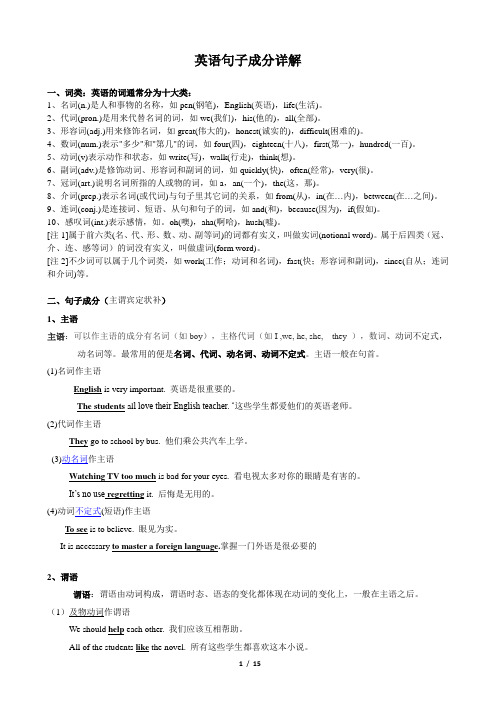
英语句子成分详解一、词类:英语的词通常分为十大类:1、名词(n.)是人和事物的名称,如pen(钢笔),English(英语),life(生活)。
2、代词(pron.)是用来代替名词的词,如we(我们),his(他的),all(全部)。
3、形容词(adj.)用来修饰名词,如great(伟大的),honest(诚实的),difficult(困难的)。
4、数词(num.)表示"多少"和"第几"的词,如four(四),eighteen(十八),first(第一),hundred(一百)。
5、动词(v)表示动作和状态,如write(写),walk(行走),think(想)。
6、副词(adv.)是修饰动词、形容词和副词的词,如quickly(快),often(经常),very(很)。
7、冠词(art.)说明名词所指的人或物的词,如a,an(一个),the(这,那)。
8、介词(prep.)表示名词(或代词)与句子里其它词的关系,如from(从),in(在…内),between(在…之间)。
9、连词(conj.)是连接词、短语、从句和句子的词,如and(和),because(因为),if(假如)。
10、感叹词(int.)表示感情,如。
oh(噢),aha(啊哈),hush(嘘)。
[注1]属于前六类(名、代、形、数、动、副等词)的词都有实义,叫做实词(notional word)。
属于后四类(冠、介、连、感等词)的词没有实义,叫做虚词(form word)。
[注2]不少词可以属于几个词类,如work(工作;动词和名词),fast(快;形容词和副词),since(自从;连词和介词)等。
二、句子成分(主谓宾定状补)1、主语主语:可以作主语的成分有名词(如boy),主格代词(如I ,we, he, she, they ),数词、动词不定式,动名词等。
最常用的便是名词、代词、动名词、动词不定式。
句子成分划分

句子成分
• 1、主语 • (1)中国人民志气高。 • (2)提高整个中华民族的科学文化水平是 亿万人民群众的切身事业。
2、谓语:是对主语加以陈
述的,说明主语怎么样或是 什么。一般由动词和形容词 充当。如:
zxxk
战士们英勇顽强。 你是学生。
• 2、谓语 • 谓语是陈述主语的,说明主语的,说明主 语“是什么”或怎么样“。例如: • (1)满天乌云顿时消散了。 -------• (2)树叶黄了。 -------• (3)小王今年十六岁。 ------------------• (4)鲁迅是中国现代文学的奠基人。 ------------------------------------------• (5)明天星期日。 ------------
第一步可先从中分出主语部分与谓语部分; 我‖ 把一盘热腾腾的菜捧上饭桌。 第二步再找出主语部分的中心词——主语 与谓语部分的中心词——谓语; 我 ‖ 把一盘热腾腾的菜捧上饭桌。 第三步分析有沒有宾语及定语、状语、补 语等各种成分。
我 ‖ 〔把一盘热腾腾的菜〕捧〖上〗饭桌。
我家的猫最怕陌生人。 我家的猫‖ 最怕陌生人。
如:呢、吧、吗、啊、罢了、啦等
感受词性 1、他的一生自然使我想起了《论语》 中孔子同他的弟子的一段对话。 名词:一生、论语、中、孔子、弟子、对话 动词:使、想起 代词:他、我 数词:一 量词:段 副词:自然 助词:的、了 介词:同
2、那个戴墨镜的人静静地等待着,还 不时用指尖轻轻地敲着桌面。
名词:墨镜、人、指尖、桌面 动词:戴、等待、敲 形容词:静静地、轻轻地 代词(指示):那个 介词:用 助词:的、地、着 连词:还 副词:不时
句子是由词或短语构成的语言单位,能表达一个 相对完整的意思,能完成一次简单的交际任务,在 语音上有一定的语调,表示陈述、疑问、祈使、感 叹的语气,在书面上用句号、问号、感叹号表示出 来。
句子成分

句子成分句子是有不同的各部分组成的,这些部分就叫做句子成分。
句子成分可以是单词、词组或句子(从句)。
在句中起主要作用的是主语、谓语,称为主要成分;起次要作用的有宾语、宾语补足语、定语、状语和表语,称为次要成分。
所有的句子都是在简单句的基础上展开的,所以我们首先讨论简单句的五种基本句型。
一、简单句的五种基本句型(Five kinds of simple sentences)(一)主语+ 不及物动词(主、谓结构)eg. 1)He is working.2)He cooks.(二)主语+ 及物动词+ 宾语(主、谓、宾结构)eg. 1)We study English every day.2)They are playing football(三)主语+ 连系动词+ 表语(主、系、表结构)eg. 1)Trees turn green.2)He is happy.常见的连系动词有:be ; become ; get(“天气”变得); turn(“颜色”变得); feel(觉得/摸起来); look(看起来);smell(闻起来); sound(听起来);taste(尝起来);seem(似乎).特别注意:a) 连系动词后常接形容词常作表语;b) be / become后常接名词或相当于名词的短语(不定式/动名词)做表语。
c) seem + 形容词= seem to be + 形容词eg.1)He is a teacher (名词做表语)2)His job is to feed animals (不定式做表语)3)His hobby is reading. (动名词做表语)4)He seems happy = He seems to be happy(四)主语+ 及物动词+ 间宾(人)+ 直宾(物)=主语+ 及物动词+ 直宾(物)+ to / for + 间宾(人)常用的此类动词有:give ; pass ; show ; lend ; buy. 但buy与for连用eg.1)I gave him a book.= I gave a book to him.2) My mother bought me a pen yesterday.= My mother bought a pen for me.(五)主语+ 及物动词+ 宾语+ 宾补注意作宾补的词:1)名词(指宾语是谁/什么);2)形容词;3)不定式;4)动词的ing 形式。
1.句子成分

请看下列句子:
1、车——间[已经]完——成—了—(全年)的~任~~务~~~。 2、 (薄薄)的轻——雾浮——起—<在池塘里> 。 3、我—家— [忽而]遭——了(一场很大)的~变~~~故~~。 4、我—[已经]读——过—<两遍>了。 5、天——气[比屋子里]—冷—得—<多>了。
6、 (绿色开花)的植——物有(庞大)的—根—系—。
_回__家___的___感___觉__又不知不觉涌上心头。
返回
2、谓语:是对主语加以 陈述的,说明主语怎么样 或是什么。一般由动词和 形容词充当。如:
战士们英勇顽强。
你是学生。
返回
3、宾语:是动词谓语后边 的连带成分,表示动作行为 涉及的人或事物. 它一般可 以回答动作行为涉及的是 “谁”或“什么”的问题. 一般由名词和代词充当.如:
— —— ~~~~~~~~~~~~~~~~~~~~~
3、兼语句链: 大家 选 他 当 班长。
—— — ~~ — ~~~~
4、双宾语句: 李老师 教 我们 语文。
——— — ~~~ ~~~~
5、连 动 句: 他们 听了 这个消息[很]高兴。 Ⅱ
—— —— ~~~~~~~ ——
6、把 字 句:
老师[亲切地][把书]放〈到他的手中〉
4、他不参加 也好。 ———— ——
5、(老年人)上大学[已经]不是(个)新鲜事儿了。
———
—— ~~~~~~
6、他说的 是(标准的)普通话。
——— —
~~~~~~
练习三、划分下列句子成分
1、鲁迅是在文化战线上,代表全民族的大多 数,向着敌人冲锋陷阵的最正确、最勇敢、 最坚决、最忠实、最热忱的空前的民族英雄。
英语句子成分讲解(详细)

英语句子成分讲解一、定义1.词类:名词(n.):表示人或事物的名称。
名词分为专有名词和普通名词;普通名词分为可数名词和不可数名词;可数名词分为个体名词和集合名词;不可数名词分为物质名词和抽象名词。
动词(v.):表示动作或状态等。
动词根据其后是否可直接跟宾语,可分为两类,分别是:及物动词(可直接跟宾语)、不及物动词(不能直接跟宾语,若要跟宾语,必须加上某个介词)。
形容词(adj.):用来修饰名词或代词。
形容词用来修饰名词或代词,表示人或事物的性质、状态,和特征的程度好坏,与否。
形容词作定语修饰名词时,要放在名词的前边。
但是如果形容词修饰以-thing结尾的词语时,要放在这些词之后。
副词(adv.):用来修饰动词、形容词或副词。
副词是一种用来修饰动词、形容词、全句的词,说明时间、地点、程度、方式等概念的词,是一种半虚半实的词。
副词可分为:地点副词、方式副词、程度副词、疑问副词和连接副词。
介词(prep.):用在名词、代词等前面,表示与别的词的关系。
介词是一种用来表示词与词、词与句之间的关系的虚词,在句中不能单独作句子成分。
介词后面一般跟名词代词或相当于名词的其他词类,短语或从句作它的宾语。
介词和它的宾语构成介词词组,在句中作状语,表语,补语或介词宾语。
介词分为:地点(位置、范围)介词、方向(目标趋向)介词、时间介词、方式介词、涉及介词、其他介词。
连词(conj.):用来连接词与词或句与句。
连词是一种虚词,它不能独立担任句子成分而只起连接词与词,短语与短语以及句与句的作用。
连词主要可分为两类:并列连词和从属连词。
并列连词用来连接平行的词、词组和分句。
从属连词用来引导名词性从句和状语从句。
冠词(art.):用在名词前帮助说明其词义。
冠词是位于名词或名词词组之前或之后,在句子里主要是对名词起限定作用的词。
冠词是一种虚词,分为定冠词the和不定冠词a、an。
代词(pron.):用来代替名词或数词等。
大多数代词具有名词和形容词的功能。
句子成分
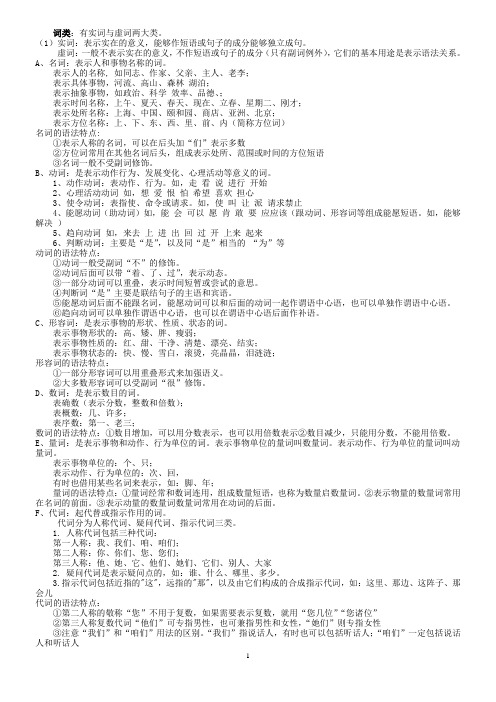
词类:有实词与虚词两大类。
(1)实词:表示实在的意义,能够作短语或句子的成分能够独立成句。
虚词:一般不表示实在的意义,不作短语或句子的成分(只有副词例外),它们的基本用途是表示语法关系。
A、名词:表示人和事物名称的词。
表示人的名称, 如同志、作家、父亲、主人、老李;表示具体事物,河流、高山、森林湖泊;表示抽象事物,如政治、科学效率、品德、;表示时间名称,上午、夏天、春天、现在、立春、星期二、刚才;表示处所名称:上海、中国、颐和园、商店、亚洲、北京;表示方位名称:上、下、东、西、里、前、内(简称方位词)名词的语法特点:①表示人称的名词,可以在后头加“们”表示多数②方位词常用在其他名词后头,组成表示处所、范围或时间的方位短语③名词一般不受副词修饰。
B、动词:是表示动作行为、发展变化、心理活动等意义的词。
1、动作动词:表动作、行为。
如,走看说进行开始2、心理活动动词如,想爱恨怕希望喜欢担心3、使令动词:表指使、命令或请求。
如,使叫让派请求禁止4、能愿动词(助动词)如,能会可以愿肯敢要应应该(跟动词、形容词等组成能愿短语。
如,能够解决)5、趋向动词如,来去上进出回过开上来起来6、判断动词:主要是“是”,以及同“是”相当的“为”等动词的语法特点:①动词一般受副词“不”的修饰。
②动词后面可以带“着、了、过”,表示动态。
③一部分动词可以重叠,表示时间短暂或尝试的意思。
④判断词“是”主要是联结句子的主语和宾语。
⑤能愿动词后面不能跟名词,能愿动词可以和后面的动词一起作谓语中心语,也可以单独作谓语中心语。
⑥趋向动词可以单独作谓语中心语,也可以在谓语中心语后面作补语。
C、形容词:是表示事物的形状、性质、状态的词。
表示事物形状的:高、矮、胖、瘦弱;表示事物性质的:红、甜、干净、清楚、漂亮、结实;表示事物状态的:快、慢、雪白,滚烫,亮晶晶,泪涟涟;形容词的语法特点:①一部分形容词可以用重叠形式来加强语义。
②大多数形容词可以受副词“很”修饰。
连词成句的秘诀分析句子成分

Exercise
我每天起的很早,走到小花园,坐在凳子上。 小鸟在树上欢快的歌唱,鱼儿在池塘 里自由的嬉戏,我玩得也高兴.
Every day I get up early, walk to the park and sit on the ____________________________________ bench. ________ ____________________________________ The birds sings happily in the tree, the fish plays freely in the pool and I also enjoys myself. __________________________________.
七)宾语补足语。英语有些及物动词,除了要有宾语之 外,还要加上宾语补足语,才能使句子的意义完整。
They elected me captain of the team. 名词 We try to make our country strong. 形容词 We found everything in good order there.介词短语 I should advise you to get the chance. to do 不定式 I saw him going upstairs. 现在分词 doing They found the house broken in. done 过去分词
(四)宾语 表示动作的对象,是动作的承受者。宾语一 动词/动词短语 之后。_____ 介词 词后也会跟宾语。 般放在___________
She covered her face with her hands. 名词 n We haven't seen her for a long time. 代词 pron 动名词 Do you mind opening the window? Give me four please. 代词和数词 He wants to dream a nice dream. to do不定式 We need know what others are doing. 句子 We should care more about our friends. 介词+名词
- 1、下载文档前请自行甄别文档内容的完整性,平台不提供额外的编辑、内容补充、找答案等附加服务。
- 2、"仅部分预览"的文档,不可在线预览部分如存在完整性等问题,可反馈申请退款(可完整预览的文档不适用该条件!)。
- 3、如文档侵犯您的权益,请联系客服反馈,我们会尽快为您处理(人工客服工作时间:9:00-18:30)。
英语句子的种类
简单句 (simple sentence)
并列句 (compound sentence)
除了be 系动词外,还有一些动词也可以用作系动词, 1)表感官的动词: feel, smell, taste, sound, look, appear, seem 等。 2) 表转变变化的动词: become, get, grow, turn, go,等 3)表延续的动词 remain, keep, hold, stay, rest等。
同等重要,其中一个句子由从属连词引 导(从句),用以修饰另一句子(主句)。
1. I met my best friend Tom at the station yesterday. ↓ ↓ ↓ ↓ ↓ ↓ 主 谓 定 宾 同 状 语 语 语 语 位 语 语 ↓ ↓ 修 修 饰 饰 名 动 词 词
常用的关联词有:though, although, if even if, even though,
8) 方式状语从句
He did just as you told him.
常用的关联词有:as, as if, as though, how
ห้องสมุดไป่ตู้
9) 程度状语从句 So long as you need me, I’ll stay.
He made a promise, but He didn’t keep it.
复合句 = 主句 + 从句
复合句与简单句:复合句 = 简单句 + 从属连词 + 简单句
它必须和一个 主句连用,不能独立存在。 复合句可以通过把两个以上简单句连接
在一起构成,但复合句的各组成部份并非
While Mr. White was taking a shower,the UFO landed on the street. when引导的状语从句的动作多为终止性动词, 也为可持续动词;但while只能是可持续动词。
考点二
not…until/ till 直到……才 …till 直到……为止
①Either
考点四
not only A but also B “不仅A而且B” “就近原则”
am going to the party. you or I _____ has seen the movie. I nor he ______
】
(或者你或者我将去晚会。)
②Neither
(我和他都没有看过这部电影。)
复合句 (complex sentence)
简单句 (simple sentence)
A.只包含一个主谓结 构Mary opened the door. B.两个主语和一个谓语
Steve and his friend are coming to dinner.
C.一个主语和两个谓语
Mary opened the door and greeted the guests.
5. I found the book‹easy. ›
主 + 谓 + 宾 + 宾补
主 + 谓 + 间接宾语 + 直接宾语
Practice
Nobody went. She became a doctor. The car caught fire. I will write you a long letter.
常用的关联词有:so, so that, in order that
6) 条件状语从句
If it snows tomorrow, we will build a snowman.
常用的关联词有:if, unless, in case that,
7) 让步状语从句 Though I’m fond of music,I can’t play any instrument.
简单句的 五种基本句型
掌握这五种基本句型, 是掌握各种 英语句子结构的基础。
Ⅰ.简单句
1. Things changed. 2. Trees are green. 3. We don’t beat children.
主 + 谓 + 宾 主 + 谓 + 表 主 + 谓
4. He gave his sister the piano.
翻译:他直到3岁才会讲话。
couldn’t speak until he was 3. He _________
我父亲直到我们吃完饭时才回来。 他经常等到妈妈叫他才起床。
didn’t come back until we had supper. My father ______
when I went to the station yesterday.
状语从句
分为九类:时间、地点、原因、结果、 目的、条件、让步、方式、程度 1) 时间状语从句 Wait until you are called. When spring came, leaves turn green.
常用的关联词有:as, after, before, since, till/ until, when, while, as soon as, whenever等
常用的关联词有:so, so that, as far as, so long as
考点一
“when” 和 “while”
C the UFO Mr. White was taking a shower _____ landed on the street.
A. where B. while C. when D. whether
e.g. (他努力工作,但以失败告终。)
He worked hard, ______ he failed at last. but He worked hard. _________, he failed at last. However
区别: but 后没有逗号,直接连接分句; however 后有逗号相隔,可放句末。
或 He is over sixty, but he works as hard as others. (2)“Because John was ill, so I took him to the doctor.” 同样,此句错误, because 和 so 等关联词都不能同时使用。
--- 连词词组 : either A or B “或者A或者B” 【连接主语 neither A nor B “既不A也不B” 时,谓语
③Not
only you but also he speaks ________ French.
(不但你而且他也讲法语。)
Exercise: 请用合适的并列连词把每组句子合并为一个并列句。 1. He was tired. He went to bed.
He was tired, so he went to bed.
???
*
观察句子 :
考点三 :
although/ though 和but这两个关联词不能同时用
(1)Although he is over sixty, but he works as hard as others. 改为:Although he is over sixty, he works as hard as others.
二、连词分类: 连词:and, but, or, so, (for)
并列连词
连词词组: either…or, neither…nor, not only…but also, both…and, (as well as) 从属连词—— that,whether, if, unless, while / when, until, because, so that, so…that, though/ although, even if, as…as 等
常用并列连词
and,both…and, not only… 平行并列连词: but also, neither…nor 转折并列连词: but,however,while,yet 因果并列连词for,so :
选择并列连词or,either…or :
考点一:
and (“和,并且”) 与 or (“否则”)
主 + 谓 + 间接宾语 + 直接宾语 主 + 谓 + 宾 主 + 谓 + 表 主 + 谓
I will let him‹ go. ›
主 + 谓 + 宾 + 宾补
He went. He went there. He went there yesterday.
He went there to see his mother yesterday.
常用的关联词有:because, as, since
4) 结果状语从句
I was in the bath so that I didn’t hear the telephone.
常用的关联词有:so, so that, such that, that
5) 目的状语从句 I’ll show you so you will see how it’s done.
2) 地点状语从句 Put it where you found it. Sit down wherever you like.
常用的关联词有:where, wherever, anywhere
3) 原因状语从句 As I didn’t know the way, I asked a policeman
